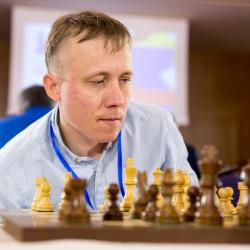GM Ruslan Ponomariov

Bio
Ukrainian GM Ruslan Ponomariov is a former FIDE world champion and one of the greatest chess prodigies in history. He earned the world title at the age of 18 and in 1997 became the youngest person at the time to become a grandmaster—only 17 days after turning 14 years old. The same year, he won the under-18 section of the World Youth Championships.
Ponomariov continued building an impressive chess career and remained in the world’s top-20 ranked players until the early 2010s. To this day, he stays active in chess by taking part in high-level chess competitions and streaming regularly.
- Playing Style
- Early Chess Career (1988 To 1996)
- Youngest GM In History At The Time (1997 To 2001)
- FIDE World Champion At 18 Years Old (2002 To 2010)
- Ukrainian Chess Champion (2011 To 2020)
- Present And Future
Playing Style
Ponomariov is a well-rounded player who doesn’t seem to have a major preference for his play. He excels in tactical and positional areas alike, as the following game, which involved two former world champions, shows.
And here, in the first game of Ponomariov’s world championship match, he builds such a strong positional advantage that his opponent resigns before the incoming combination on the f7-square.
Early Chess Career (1988 To 1996)
Ponomariov learned how to play chess when he was five years old. Four years after his father taught him the game, Ponomariov was a Class A player (rating category of 1800-1999), and at the age of 10, he moved to Kramatorsk, Ukraine. There he joined the famous A. V. Momot Kramatorsk Chess Club, which has produced other top GMs like Sergey Karjakin and Kateryna Lagno.
The 10-year-old immediately started to show his potential in 1994. He placed third in the under-12 section of the World Youth Chess Championship. Later, as a 12-year-old, Ponomariov won the under-18 European Championship in 1994.
Youngest GM In History At The Time (1997 To 2001)
Ponomariov won the under-18 section of the World Youth Chess Championship in 1997, taking the world title at the age of 13.
An even bigger accomplishment came that year for the talented chess prodigy, just 17 days after his 14th birthday. That marked when Ponomariov won the Kiev NIKA-VV International tournament and achieved his final GM norm, which made him the youngest grandmaster in history. His record was broken two years later by GM Bu Xiangzhi, and now Ponomariov is the 14th youngest GM of all time.
After winning his GM title, Ponomariov went undefeated at the Donetsk Zonal in 1998, winning the event as a 15-year-old over GMs Alexander Zubarev and Alexander Onischuk. He also made his first appearance on the Ukrainian team in the 1998 Chess Olympiad. Ponomariov went undefeated with 7/9 points as a reserve on the bronze-medal winning team anchored by GMs Vassily Ivanchuk and Onischuk.
In 1999, Ponomariov led the youth national team to gold in the under-16 Chess Olympiad, going 6.5/7 on the top board for a tournament performance rating of 2755. He also played in the FIDE World Chess Championship knockout event, winning his first-round matchup against GM Mohamad Al-Modiahki before losing to GM Veselin Topalov in blitz tiebreakers the next round.
Ponomariov scored 5/7 points in the European Club Cup 2000, which he won against then-FIDE World Champion GM Alexander Khalifman. In the 2000 Chess Olympiad, he played second board for Ukraine, which won its second consecutive bronze medal. Ponomariov went undefeated once again, this time with 8.5/11 points, granting the 17-year-old an individual gold medal.
In 2001, Ponomariov won the Governor’s Cup in Kramatorsk. He finished with 7/10 points, one and a half points ahead of the second-place finisher, GM Aleksej Aleksandrov.
FIDE World Champion At 18 Years Old (2002 To 2010)
Ponomariov was the 19th seed at the 2002 FIDE World Chess Championship. It was a 128-player knockout with two-game matches in the first five rounds, four-game matches in the semifinals, and eight-game matches in the finals.
The 18-year-old made quick work of his first three opponents, finishing off IM Li Wenliang, GM Sergei Tiviakov, and GM Kiril Georgiev in the early rounds. Ponomariov then won 2.5-1.5 against the third seed, GM Alexander Morozevich, in the fourth round. The upsets continued with wins against GMs Evgeny Bareev (3-1) and Peter Svidler (2.5-1.5) in the quarterfinals and semifinals, respectively.
In the final round, Ponomariov faced GM Vassily Ivanchuk, who was ranked fourth in the event and had been ranked second in the world in 1991 and 1992 (and again later in 2007). The 18-year-old prodigy didn’t falter against the more experienced 32-year-old Ukrainian player. Ponomariov took an early lead in the match with a win in game one and then capped off an undefeated performance to take the championship by a score of 4.5-2.5.
The win meant that Ponomariov, just a few months after his 18th birthday, was the FIDE World Champion—by far the youngest to do so. Note that this was when the world title was split, so the current and previous classical world champions, GMs Vladimir Kramnik and Garry Kasparov, respectively, didn’t take part in this world championship event.
Also in 2002, Ponomariov finished in sole second place behind Kasparov and ahead of Ivanchuk and GMs Viswanathan Anand and Michael Adams at the elite Linares tournament. At the Bali Hotel International rapid tournament, Ponomariov finished ahead of GMs Alexei Shirov and Anatoly Karpov in equal first place with GM Judit Polgar but lost to her in playoffs.
In 2003, it looked like Ponomariov would play in a 14-game match with Kasparov to help reunify the world title. The idea was that the Ponomariov-Kasparov winner would play the classical world champion (either Kramnik or GM Peter Leko in their 2004 match). However, both matches fell through, and Ponomariov didn’t attempt to defend his FIDE world title in 2004, so it went to GM Rustam Kasimdzhanov for winning the FIDE World Chess Championship 2004.
At both the 2004 and 2010 Chess Olympiads, Ponomariov played second board for Ukraine and helped his country win gold in both events. Other accomplishments during this period include winning three rapid tournaments: the Ciudad de Leon Tournament in 2003, the Pamplona International in 2005, and the Efim Geller Memorial Tournament in 2005 with just one loss in all three events. Ponomariov won the 2010 Dortmund Sparkassen Chess Meeting a full point ahead of GM Le Quang Liem. Ponomariov placed second at the 2005 Chess World Cup, the 2009 Donostia Chess Festival, and the 2009 Chess World Cup.
Ukrainian Chess Champion (2011 To 2020)
In 2011, Ponomariov won the 80th Ukrainian Chess Championship a full point ahead of GM Pavel Eljanov. All 12 participants in the event were grandmasters, and the field had an average rating of 2650.5, making it the strongest event in the history of independent Ukraine.
Ponomariov continued to play at a high level in team competitions. Staying on board two for Ukraine, he had just one loss combined in both the 2012 and 2014 Chess Olympiads. The team won bronze in 2012, and 2014 would be the last year for Ponomariov at the competition to date. He never finished below 50 percent for any of his seven Olympiads, with an overall 64.7 percent performance (25 wins, 38 draws and five losses). Later, at the 2015 World Team Chess Championship, he played first board and led Ukraine to a silver medal.

Other accomplishments during this period include second place at the Aeroflot Blitz event in 2011 and a bronze medal at the FIDE World Blitz Championship 2013 behind Liem and GM Alexander Grischuk. Recently, he has played in the Pro Chess League and also in high-level competitions. For instance, he played in the 2019 FIDE Chess.com Grand Swiss and, in the 2019 European Chess Championship, finished in 25th place with an undefeated performance.
Present And Future
Ponomariov has an incredible chess resume, and it seems that he’ll continue to grace the chess world with his presence. Whether it’s by playing in big tournaments or with his fantastic chess stream, he’s still contributing a great deal to the game.


